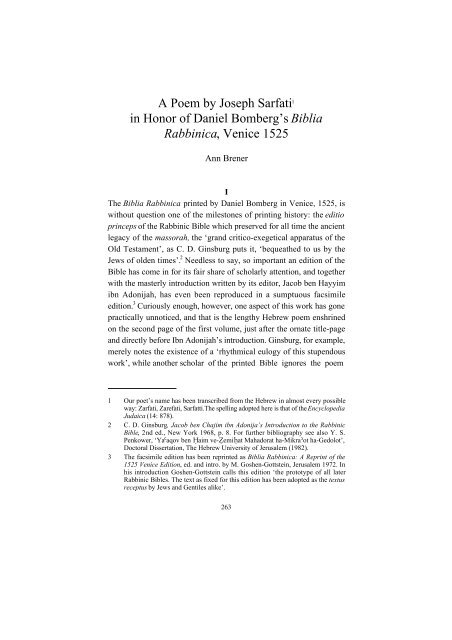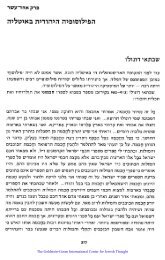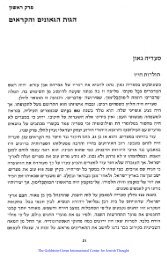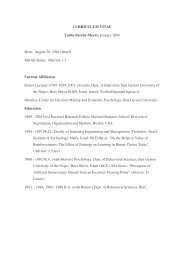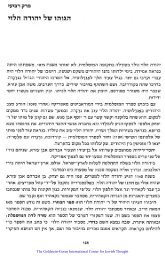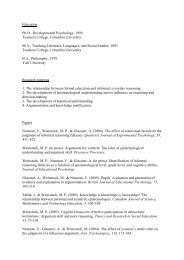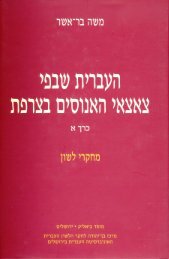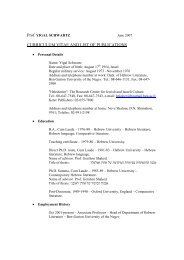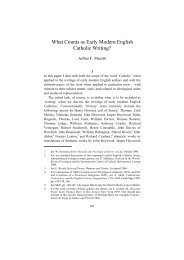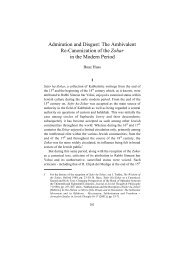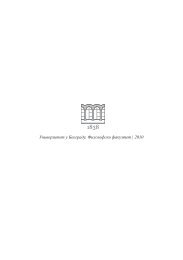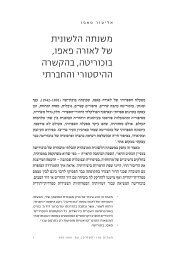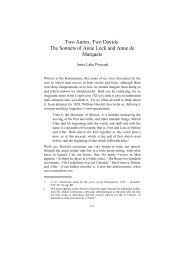A Poem by Joseph Sarfati in Honor of Daniel Bomberg's
A Poem by Joseph Sarfati in Honor of Daniel Bomberg's
A Poem by Joseph Sarfati in Honor of Daniel Bomberg's
You also want an ePaper? Increase the reach of your titles
YUMPU automatically turns print PDFs into web optimized ePapers that Google loves.
A <strong>Poem</strong> <strong>by</strong> <strong>Joseph</strong> <strong>Sarfati</strong> 1<br />
<strong>in</strong> <strong>Honor</strong> <strong>of</strong> <strong>Daniel</strong> Bomberg’s Biblia<br />
Rabb<strong>in</strong>ica, Venice 1525<br />
Ann Brener<br />
I<br />
The Biblia Rabb<strong>in</strong>ica pr<strong>in</strong>ted <strong>by</strong> <strong>Daniel</strong> Bomberg <strong>in</strong> Venice, 1525, is<br />
without question one <strong>of</strong> the milestones <strong>of</strong> pr<strong>in</strong>t<strong>in</strong>g history: the editio<br />
pr<strong>in</strong>ceps <strong>of</strong> the Rabb<strong>in</strong>ic Bible which preserved for all time the ancient<br />
legacy <strong>of</strong> the massorah, the ‘grand critico-exegetical apparatus <strong>of</strong> the<br />
Old Testament’, as C. D. G<strong>in</strong>sburg puts it, ‘bequeathed to us <strong>by</strong> the<br />
Jews <strong>of</strong> olden times’. 2 Needless to say, so important an edition <strong>of</strong> the<br />
Bible has come <strong>in</strong> for its fair share <strong>of</strong> scholarly attention, and together<br />
with the masterly <strong>in</strong>troduction written <strong>by</strong> its editor, Jacob ben Hayyim<br />
ibn Adonijah, has even been reproduced <strong>in</strong> a sumptuous facsimile<br />
edition. 3 Curiously enough, however, one aspect <strong>of</strong> this work has gone<br />
practically unnoticed, and that is the lengthy Hebrew poem enshr<strong>in</strong>ed<br />
on the second page <strong>of</strong> the first volume, just after the ornate title-page<br />
and directly before Ibn Adonijah’s <strong>in</strong>troduction. G<strong>in</strong>sburg, for example,<br />
merely notes the existence <strong>of</strong> a ‘rhythmical eulogy <strong>of</strong> this stupendous<br />
work’, while another scholar <strong>of</strong> the pr<strong>in</strong>ted Bible ignores the poem<br />
1 Our poet’s name has been transcribed from the Hebrew <strong>in</strong> almost every possible<br />
way: Zarfati, Zarefati, Sarfatti.The spell<strong>in</strong>g adopted here is that <strong>of</strong> the Encyclopedia<br />
Judaica (14: 878).<br />
2 C. D. G<strong>in</strong>sburg, Jacob ben Chajim ibn Adonija’s Introduction to the Rabb<strong>in</strong>ic<br />
Bible, 2nd ed., New York 1968, p. 8. For further bibliography see also Y. S.<br />
Penkower, ‘Ya‘aqov ben Óaim ve-Ûemi˙at Mahadorat ha-Mikra’ot ha-Gedolot’,<br />
Doctoral Dissertation, The Hebrew University <strong>of</strong> Jerusalem (1982).<br />
3 The facsimile edition has been repr<strong>in</strong>ted as Biblia Rabb<strong>in</strong>ica: A Repr<strong>in</strong>t <strong>of</strong> the<br />
1525 Venice Edition, ed. and <strong>in</strong>tro. <strong>by</strong> M. Goshen-Gottste<strong>in</strong>, Jerusalem 1972. In<br />
his <strong>in</strong>troduction Goshen-Gottste<strong>in</strong> calls this edition ‘the prototype <strong>of</strong> all later<br />
Rabb<strong>in</strong>ic Bibles. The text as fixed for this edition has been adopted as the textus<br />
receptus <strong>by</strong> Jews and Gentiles alike’.<br />
263
Ann Brener<br />
Biblia Rabb<strong>in</strong>ica 1523<br />
Photograph courtesy <strong>of</strong> the Jewish National and University Library, Jerusalem<br />
264
A <strong>Poem</strong> <strong>by</strong> <strong>Joseph</strong> <strong>Sarfati</strong><br />
altogether. 4 But as its conspicuous place <strong>in</strong> the Bomberg edition surely<br />
<strong>in</strong>dicates, the poem is deserv<strong>in</strong>g <strong>of</strong> attention <strong>in</strong> its own right. It was<br />
written <strong>by</strong> <strong>Joseph</strong> <strong>Sarfati</strong>, one <strong>of</strong> the greatest Hebrew poets <strong>of</strong><br />
Renaissance Italy and arguably one <strong>of</strong> the most fasc<strong>in</strong>at<strong>in</strong>g personalities<br />
<strong>of</strong> the day. This article, therefore, is an attempt to br<strong>in</strong>g <strong>Sarfati</strong>’s poem<br />
for the Biblia Rabb<strong>in</strong>ica <strong>in</strong>to the limelight <strong>of</strong> modern scholarship, and<br />
to show its place <strong>in</strong> the world <strong>of</strong> Hebrew pr<strong>in</strong>t<strong>in</strong>g <strong>in</strong> sixteenth-century<br />
Venice.<br />
II<br />
The Biblia Rabb<strong>in</strong>ica <strong>of</strong> 1525 is also known as the Second Rabb<strong>in</strong>ic<br />
Bible, for as the name <strong>in</strong>dicates it was not the first Rabb<strong>in</strong>ic Bible ever<br />
published; this was achieved <strong>by</strong> Bomberg himself nearly ten years<br />
earlier, <strong>in</strong> 1517. But the First Rabb<strong>in</strong>ic Bible, the one <strong>of</strong> 1517, was<br />
problematic from the start. 5 It was edited, for one th<strong>in</strong>g, <strong>by</strong> a Jewish<br />
convert to Christianity, Felix Pratensis (Felice da Prato), a fact which<br />
did little to recommend the edition to the Jewish book-buy<strong>in</strong>g public.<br />
Nor did the Lat<strong>in</strong> dedication to Pope Leo X do much to improve<br />
matters. More important, the marg<strong>in</strong>al notes prepared <strong>by</strong> Pratensis<br />
were deemed wholly <strong>in</strong>adequate; one contemporary authority, the<br />
renowned Elias Levita, sniffed that ‘the author [i.e. Pratensis] did not<br />
know his right hand from his left’ and sternly bade his readers to pay<br />
4 C. D. G<strong>in</strong>sburg, Introduction to the Massoretico-Critical Edition <strong>of</strong> the Hebrew<br />
Bible, 2nd ed., New York 1966, p. 960; B. Pick, ‘History <strong>of</strong> the Pr<strong>in</strong>ted Editions<br />
<strong>of</strong> the Old Testament, Together with a Description <strong>of</strong> the Rabb<strong>in</strong>ic and the<br />
Polyglot Bibles’, Hebraica IX (1892/93), pp. 65-67. More recently, Marv<strong>in</strong> J.<br />
Heller describes the poem briefly as ‘forty-two l<strong>in</strong>es <strong>of</strong> verse <strong>in</strong> praise <strong>of</strong> the<br />
work <strong>by</strong> R. <strong>Joseph</strong> ben Samuel Zarfati, perhaps one <strong>of</strong> the correctors’ <strong>in</strong> The<br />
Sixteenth Century Hebrew Book: An Abridged Thesaurus, Leiden 2004, Vol. 1,<br />
p. 169. The only scholar to have paid any real attention to the poem is Dan<br />
Almagor, who br<strong>in</strong>gs brief excerpts from the poem <strong>in</strong> ‘Shirim ‘al-Sefarim le-Yosef<br />
ben Shmuel <strong>Sarfati</strong>’, <strong>in</strong>: Y. Rosenberg ed., Asufot Kiryat Sefer (a supplement to<br />
Kiryat Sefer 68), Jerusalem 1998, pp. 23-24.<br />
5 On the First Rabb<strong>in</strong>ic Bible see D. W. Amram, The Makers <strong>of</strong> Hebrew Books <strong>in</strong><br />
Italy, Philadelphia 1909, pp. 155-157; J. Bloch, ‘Venetian Pr<strong>in</strong>ters <strong>of</strong> Hebrew<br />
Books’, <strong>in</strong>: C. Berl<strong>in</strong> ed., Hebrew Pr<strong>in</strong>t<strong>in</strong>g and Bibliography, New York 1976,<br />
pp. 67-70; G<strong>in</strong>sburg, Introduction to the Massoretico-Edition <strong>of</strong> the Hebrew<br />
Bible, pp. 925-955; Goshen-Gottste<strong>in</strong>, Biblia Rabb<strong>in</strong>ica, Intro. pp. 7-8; Y. S.<br />
Penkower, ‘Mahadorat ha-Tanakh ha-Rishonah she-HoΩi Bomberg le-’Or’, Kiryat<br />
Sefer 58 (1983), pp. 586-604.<br />
265
Ann Brener<br />
no attention to ‘the false remarks pr<strong>in</strong>ted <strong>in</strong> the marg<strong>in</strong>’. 6 Thus when<br />
<strong>Daniel</strong> Bomberg encountered Ibn Adonijah, a scholarly refugee from<br />
Tunis who expla<strong>in</strong>ed to him the importance <strong>of</strong> the massorah and the<br />
need to publish it entire, Bomberg was ripe for a new edition. Ibn<br />
Adonijah describes the enormous scope <strong>of</strong> the work which he now<br />
undertook, and which only Bomberg’s generous fund<strong>in</strong>g made possible:<br />
the search for manuscripts, the collation <strong>of</strong> fragments, the ceaseless<br />
scrut<strong>in</strong>y <strong>of</strong> commentaries and traditions. 7 The result <strong>of</strong> this ambitious<br />
collaboration between scholar and pr<strong>in</strong>ter was the magnificent Biblia<br />
Rabb<strong>in</strong>ica <strong>of</strong> 1525: the prototype <strong>of</strong> all Rabb<strong>in</strong>ic Bibles to come.<br />
In his well-known study <strong>of</strong> Hebrew pr<strong>in</strong>t<strong>in</strong>g <strong>in</strong> Italy, David W.<br />
Amram sketches a typical day at the pr<strong>in</strong>t<strong>in</strong>g press <strong>of</strong> <strong>Daniel</strong> Bomberg<br />
<strong>in</strong> Venice 1525, <strong>in</strong> an entic<strong>in</strong>g scene worth br<strong>in</strong>g<strong>in</strong>g <strong>in</strong> detail:<br />
We may easily picture the scene <strong>in</strong> Bomberg’s press room, busy<br />
with workmen <strong>of</strong> half a dozen nationalities, typical <strong>of</strong> the<br />
cosmopolitan character <strong>of</strong> Venice and the universality <strong>of</strong> the<br />
press. As the press is unscrewed, a skillful hand pulls the sheet<br />
and passes it still moist under the eye <strong>of</strong> the critical foreman <strong>of</strong><br />
the shop, Cornelio the son <strong>of</strong> Barukh Adelk<strong>in</strong>d, late <strong>of</strong> Padua.<br />
Scholars and noblemen crowd around, look<strong>in</strong>g over his shoulder<br />
to <strong>in</strong>spect some new typographical effect and express their<br />
criticism or admiration <strong>in</strong> the lively and spirited manner <strong>of</strong> the<br />
Venetian. In one corner a group <strong>of</strong> grave scholars is handl<strong>in</strong>g<br />
some books and discuss<strong>in</strong>g f<strong>in</strong>e po<strong>in</strong>ts <strong>of</strong> scholarship, <strong>in</strong> another,<br />
Moses del Castellazo, illustrator <strong>of</strong> the Bible, is discuss<strong>in</strong>g wood<br />
engrav<strong>in</strong>g with some dilettanti … Among them all moves the<br />
master <strong>of</strong> the shop, the stately Bomberg, <strong>in</strong> his broidered robe<br />
and high cap, with the dignity <strong>of</strong> the successful man and the<br />
urbanity <strong>of</strong> the cosmopolite. 8<br />
6 Elias Levita, <strong>in</strong> his <strong>in</strong>troduction to Massoreth Ha-Massoreth <strong>of</strong> Elias Levita, C.<br />
D. G<strong>in</strong>sburg ed., 2nd ed., New York 1968, p. 115. The differences between the<br />
First and Second Rabb<strong>in</strong>ic Bibles are discussed <strong>in</strong> Goshen-Gottste<strong>in</strong>, Biblia<br />
Rabb<strong>in</strong>ica, Intro. p. 8; Penkower, ‘Ya‘aqov ben Óaim’ (above, n. 2), especially<br />
chapters 1 and 4.<br />
7 See Ibn Adonijah’s Introduction to the Rabb<strong>in</strong>ic Bible (above, n. 2), pp. 38-39,<br />
83-84.<br />
8 Amram, The Makers <strong>of</strong> Hebrew Books, pp. 176-177.<br />
266
A <strong>Poem</strong> <strong>by</strong> <strong>Joseph</strong> <strong>Sarfati</strong><br />
Amram’s vibrant panorama <strong>of</strong> Renaissance life takes us <strong>in</strong>to the heart<br />
<strong>of</strong> the Venetian workshop. We can easily picture the skillful Cornelio<br />
with his hand at the press, the eagerly chatt<strong>in</strong>g scholars and nobles, the<br />
renowned illustrator discuss<strong>in</strong>g his woodcuts, even Bomberg himself<br />
<strong>in</strong> his ‘broidered robe and high cap’. Perfect as this picture is, however,<br />
we might add yet one other figure to this bustl<strong>in</strong>g scene <strong>of</strong> work, and<br />
that is the figure <strong>of</strong> a Hebrew poet deeply <strong>in</strong>tent on his poem, perhaps<br />
<strong>of</strong>f <strong>in</strong> a corner somewhere, out <strong>of</strong> the hustle-and-bustle <strong>of</strong> the workroom,<br />
tapp<strong>in</strong>g syllables with his f<strong>in</strong>gers and count<strong>in</strong>g out vowels. Whether<br />
he was wear<strong>in</strong>g the yellow badge <strong>of</strong> the Venetian Jew or had availed<br />
himself <strong>of</strong> Bomberg’s measures to free his Jewish craftsmen from this<br />
public sign <strong>of</strong> obloquy we will have to leave to the imag<strong>in</strong>ation <strong>of</strong> our<br />
readers. 9 But to such a poet we can give a name, and there<strong>by</strong> <strong>in</strong>troduce<br />
the author <strong>of</strong> the poem to whom we now turn our attention: <strong>Joseph</strong> ben<br />
Samuel <strong>Sarfati</strong>.<br />
III<br />
Except to the cognoscenti, the name <strong>of</strong> <strong>Joseph</strong> <strong>Sarfati</strong> means very little<br />
to us today. But <strong>in</strong> the early decades <strong>of</strong> sixteenth-century Italy, <strong>Joseph</strong><br />
<strong>Sarfati</strong> was a well-known figure; the respected physician <strong>of</strong> Pope<br />
Clement VII and the scion to a highly connected Jewish family from<br />
Rome. Samuel <strong>Sarfati</strong>, <strong>Joseph</strong>’s father, had himself been the renowned<br />
physician to two popes, Alexander VI and Julius II, while a third pope,<br />
Leon X, confirmed the special privileges granted the Jewish physician<br />
<strong>by</strong> his two papal predecessors. 10 In 1515 Samuel <strong>Sarfati</strong> was summoned<br />
to Florence to treat the son <strong>of</strong> Lorenzo de’ Medici, and as Cassuto<br />
suggests, it appears that his son, <strong>Joseph</strong>, accompanied his father. For it<br />
is <strong>in</strong> Florence that we f<strong>in</strong>d <strong>Joseph</strong> <strong>Sarfati</strong> flourish<strong>in</strong>g among the ranks<br />
<strong>of</strong> what may be called a circle <strong>of</strong> Hebrew poets, exchang<strong>in</strong>g poems<br />
9 H. F. Brown, The Venetian Pr<strong>in</strong>t<strong>in</strong>g Press, New York and London 1891, p. 105.<br />
10 M. D. Cassuto, Ha-Yehudim be-Firenze bi-Tequfat ha-Renasans, Jerusalem 1967,<br />
p. 269. Cassuto cites <strong>in</strong> note 36 the <strong>in</strong>formation published <strong>by</strong> H. Vogelste<strong>in</strong> and<br />
P. Rieger, Geschichte der Juden <strong>in</strong> Rom, Berl<strong>in</strong> 1895-1896, pp. 83-84. For<br />
further bibliography and the text <strong>of</strong> the papal privileges themselves, see the<br />
sources listed <strong>in</strong> D. Almagor, ‘Yosef ben Shmuel <strong>Sarfati</strong>: Bibliografia Mu‘eret’,<br />
Italia 12 (1996), pp. 57-113 (esp. nos. 8, 16, 19, 20).<br />
267
Ann Brener<br />
with such local poets as Moses ben Joab da Rieti and Solomon da<br />
Poggibonsi and express<strong>in</strong>g himself <strong>in</strong> verse on subjects rang<strong>in</strong>g from<br />
panegyric and card-play<strong>in</strong>g to riddles and gluttony. 11<br />
In addition to be<strong>in</strong>g a poet, <strong>Joseph</strong> <strong>Sarfati</strong> was also the Hebrew<br />
translator <strong>of</strong> Malibea and Calisto, the Renaissance’s own version <strong>of</strong> a<br />
Broadway block-buster complete with clandest<strong>in</strong>e lovers and midnight<br />
trysts. The Hebrew version <strong>of</strong> this play takes its title Celest<strong>in</strong>a from<br />
the bawd who plays a central role <strong>in</strong> the plot, but apart from the<br />
sixty-two l<strong>in</strong>e poem with which <strong>Sarfati</strong> <strong>in</strong>troduced his translation the<br />
Hebrew Celest<strong>in</strong>a has not come down to us. 12<br />
The death <strong>of</strong> his father sometime before 1524 brought a dramatic<br />
change <strong>in</strong> the tenor <strong>of</strong> <strong>Joseph</strong>’s life. To quote Cassuto:<br />
An unscrupulous servant seized all the wealth <strong>in</strong> his [father’s]<br />
c<strong>of</strong>fers and fled to Constant<strong>in</strong>ople. Unfortunately for <strong>Joseph</strong><br />
himself, he decided to go after the thief, and the latter, <strong>in</strong> order<br />
to save his own sk<strong>in</strong>, handed <strong>Joseph</strong> over to the authorities<br />
claim<strong>in</strong>g that he was a spy for the Pope. Agents <strong>of</strong> the Turkish<br />
police attacked <strong>Joseph</strong> and wounded him, and he just barely<br />
managed to escape and return to Italy, without any hope <strong>of</strong> ever<br />
recover<strong>in</strong>g his possessions. 13<br />
Upon return<strong>in</strong>g to Italy <strong>Joseph</strong> applied to Clement VII (<strong>in</strong> 1524) for<br />
the special privileges enjoyed <strong>by</strong> his father, and receiv<strong>in</strong>g them without<br />
mishap settled down to a prosperous existence <strong>in</strong> Rome. There he<br />
11 Cassuto, Ha-Yehudim be-Firenze, pp. 265-272. Most <strong>of</strong> the poems <strong>by</strong> Moses<br />
ben Joab da Rieti rema<strong>in</strong> <strong>in</strong> manuscript (MS Montefiore 366); for a good selection<br />
see Y. Schirmann, Miv˙ar ha-Shirah ha-‘Ivrit be-Italia, Berl<strong>in</strong> 1934, pp. 236-240.<br />
Dan Almagor discusses the relations between <strong>Sarfati</strong>, Moses ben Joab and<br />
Poggibonsi <strong>in</strong> Ha-Do’ar 73 (18.3.1994), pp. 22-26.<br />
12 The Spanish play was written <strong>by</strong> Fernando de Rojas (d. 1541). It was first<br />
pr<strong>in</strong>ted <strong>in</strong> Burgos, 1499, but the standard text, <strong>of</strong>ten repr<strong>in</strong>ted throughout the<br />
sixteenth century, is based on the first complete edition <strong>of</strong> 1502. For a recent<br />
edition see E. de Miguel Mart<strong>in</strong>ez ed., La Celest<strong>in</strong>a de Rojas, Madrid 1996. The<br />
play was first translated <strong>in</strong>to English <strong>by</strong> James Mabbe <strong>in</strong> 1631, and aga<strong>in</strong> <strong>by</strong><br />
Phyllis Hartnoll as Celest<strong>in</strong>a, London 1959. As noted, <strong>Sarfati</strong>’s Hebrew translation<br />
has not come down to us, but the poem <strong>in</strong>troduc<strong>in</strong>g the translation was published<br />
<strong>by</strong> M. D. Cassuto, ‘Mi-Shirei Yosef Shmuel <strong>Sarfati</strong>: ha-Komedia ha-Rishona<br />
be-‘Ivrit’, <strong>in</strong>: Studies <strong>in</strong> <strong>Honor</strong> <strong>of</strong> Alexander Kohut, New York 1936, pp. 124-128<br />
(Hebrew section).<br />
13 Cassuto, Ha-Yehudim be-Firenze (above, n. 10), p. 270 (translation m<strong>in</strong>e).<br />
268
A <strong>Poem</strong> <strong>by</strong> <strong>Joseph</strong> <strong>Sarfati</strong><br />
played a role <strong>in</strong> the curious events <strong>in</strong>volv<strong>in</strong>g David Reubeni, the selfproclaimed<br />
emissary <strong>of</strong> an <strong>in</strong>dependent Jewish k<strong>in</strong>gdom supposedly<br />
ruled <strong>by</strong> his brother and populated <strong>by</strong> descendants <strong>of</strong> the lost Ten<br />
Tribes. 14 <strong>Joseph</strong> <strong>Sarfati</strong>’s short but productive life came to a tragic end<br />
<strong>in</strong> 1527 when the soldiers <strong>of</strong> Charles V pillaged Rome, and he found<br />
himself stripped <strong>of</strong> all his possessions yet aga<strong>in</strong>. Thrown <strong>in</strong>to prison<br />
and held for ransom, <strong>Sarfati</strong> escaped his captors as they lay <strong>in</strong> a<br />
drunken stupor and fled to a village on the outskirts <strong>of</strong> Rome. There<br />
he fell ill from the plague, was banished from town, and took to liv<strong>in</strong>g<br />
<strong>in</strong> a miserable hut out <strong>in</strong> the fields where he died, as Cassuto writes,<br />
‘more from starvation than from illness’. 15<br />
The fate <strong>of</strong> <strong>Sarfati</strong>’s poems has <strong>in</strong> many ways been almost as<br />
unfortunate as that <strong>of</strong> their author. Up to the present time his poems<br />
have been published only sporadically <strong>in</strong> various articles and<br />
newspapers, and his collected poems have yet to receive the critical<br />
edition they surely deserve. 16 And however well-known his poetry<br />
may have been <strong>in</strong> his own day, only three <strong>of</strong> <strong>Sarfati</strong>’s poems, so far as<br />
we know, were published dur<strong>in</strong>g his life-time: two poems for the<br />
Biblia Rabb<strong>in</strong>ica <strong>of</strong> 1525, and a third, short poem <strong>of</strong> six l<strong>in</strong>es for a<br />
prayer book issued <strong>by</strong> <strong>Daniel</strong> Bomberg <strong>in</strong> 1524. 17 True, there are a<br />
number <strong>of</strong> short poems <strong>by</strong> <strong>Sarfati</strong> which appear to have been written<br />
14 <strong>Sarfati</strong> hosted Reubeni dur<strong>in</strong>g his stay <strong>in</strong> Rome <strong>in</strong> 1524-1525; <strong>in</strong> his diary,<br />
Reubeni notes a visit <strong>by</strong> <strong>Sarfati</strong> to Florence. Reubeni’s diary was preserved <strong>in</strong> a<br />
unique MS <strong>in</strong> the Bodleian Library, and has been translated <strong>by</strong> E. N. Adler <strong>in</strong><br />
Jewish Travellers <strong>in</strong> the Middle Ages, New York 1987, pp. 251-328. For references<br />
to <strong>Sarfati</strong> see pp. 273-276.<br />
15 Cassuto, Ha-Yehudim be-Firenze, p. 270, cit<strong>in</strong>g the account <strong>by</strong> Giampietro<br />
Valeriano Bolzani, De <strong>in</strong>felicitate literatorum, Venetiis 1620, pp. 20-21, with<br />
later editions noted <strong>by</strong> Almagor, ‘Bibliografia Mu’eret’ (above, n.10), no. 5. In<br />
this book on ‘unfortunate scholars’ <strong>Sarfati</strong> is called Giuseppe Gallo.<br />
16 Dan Almagor has done a great service <strong>in</strong> publish<strong>in</strong>g his extensive bibliography<br />
concern<strong>in</strong>g the poetry <strong>of</strong> <strong>Joseph</strong> <strong>Sarfati</strong>, which also <strong>in</strong>cludes all articles and<br />
books mention<strong>in</strong>g the poet published up till 1996. For full details, see above,<br />
note 10. For a good selection <strong>of</strong> <strong>Sarfati</strong>’s poems, see Schirmann, Miv˙ar ha-Shirah<br />
ha-‘Ivrit be-Italia (above, n. 11), pp. 223-235.<br />
17 Pr<strong>in</strong>ted at the beg<strong>in</strong>n<strong>in</strong>g <strong>of</strong> the prayer-book תחנות תפילות ספרד ,תמונות published <strong>by</strong><br />
יופי סדר זאת <strong>Daniel</strong> Bomberg, Venice 1524. The poem beg<strong>in</strong>s wth the words<br />
and it praises the physical beauty <strong>of</strong> the pr<strong>in</strong>ted edition, to which ‘noth<strong>in</strong>g התפילה<br />
on earth can compare’ (l. 2). Listed <strong>in</strong> Israel Davidson, OΩar ha-Shirah ve-ha-<br />
Piyyuª, New York 1970, Vol. II, no. 2169, p. 359.<br />
269
Ann Brener<br />
for the pr<strong>in</strong>t<strong>in</strong>g <strong>of</strong> specific Hebrew works, but whether these poems<br />
ever appeared <strong>in</strong> the editions <strong>in</strong> question, or whether these editions<br />
were even published at all is beyond our ability to say. 18 Be this as it<br />
may, the poem pr<strong>in</strong>ted <strong>in</strong> the Second Rabb<strong>in</strong>ic Bible is not only the<br />
longest <strong>of</strong> these poems written <strong>in</strong> praise <strong>of</strong> books but also <strong>by</strong> far the<br />
f<strong>in</strong>est.<br />
That Bomberg chose to grace the open<strong>in</strong>g <strong>of</strong> his Biblia Rabb<strong>in</strong>ica<br />
with a laudatory poem should come as no surprise. The writ<strong>in</strong>g <strong>of</strong><br />
poems <strong>in</strong> praise <strong>of</strong> books can be traced back to the earliest <strong>of</strong> the<br />
Renaissance humanists; Italian humanists, as Konrad Haebler <strong>in</strong>forms<br />
us, ‘began very early to add accompany<strong>in</strong>g verses to issues edited <strong>by</strong><br />
themselves or their friends, or to their own productions. With the<br />
German classical scholars it became the fashion to place such verses<br />
on the title page’. 19 For these early humanists, needless to say, Lat<strong>in</strong><br />
was the language <strong>of</strong> choice, 20 but contributions <strong>in</strong> Hebrew for Hebrewlanguage<br />
books were not far beh<strong>in</strong>d. Already <strong>in</strong> 1475 we f<strong>in</strong>d a poem<br />
prais<strong>in</strong>g the new art <strong>of</strong> pr<strong>in</strong>t<strong>in</strong>g at the end <strong>of</strong> the first dated Hebrew<br />
book, the Arba‘a Turim (Four Rows) <strong>by</strong> R. Jacob b. Asher. 21 Two<br />
years later the first pr<strong>in</strong>ted Hebrew Psalter also concludes with a brief<br />
poem <strong>of</strong> praise for pr<strong>in</strong>t<strong>in</strong>g, and the list goes steadily on. 22<br />
This writ<strong>in</strong>g <strong>of</strong> poems for pr<strong>in</strong>ted volumes began modestly enough<br />
but <strong>by</strong> the seventeenth century the ‘art <strong>of</strong> puff<strong>in</strong>g’, as the phenomenon<br />
became known, developed <strong>in</strong>to a full-fledge craze. In England, for<br />
18 See D. Almagor, ‘Shirim ‘al-Sefarim le-Yosef ben Shmuel <strong>Sarfati</strong>’ (above, n.<br />
4), pp. 27, 33.<br />
19 K. Haebler, The Study <strong>of</strong> Incunabula, L. E. Osborne trans., New York 1933, p.<br />
49.<br />
20 For a selection <strong>of</strong> such Lat<strong>in</strong> encomiums for books see A. W. Pollard, An Essay<br />
on Colophons with Specimens and Translations, Chicago 1905.<br />
21 Pr<strong>in</strong>ted <strong>by</strong> Meshullam Cusi and Sons <strong>in</strong> Piove di Sacco, 1475 (G<strong>of</strong>f Heb 47;<br />
Thes A.2; S-T.C. 11). The poem is transcribed and translated <strong>in</strong> G<strong>in</strong>sburg,<br />
Introduction to the Massoretico-Critical Edition (above, n. 4), pp. 779-780.<br />
22 These Hebrew books <strong>in</strong>clude the first pr<strong>in</strong>ted Psalter, Bologna 1477 (G<strong>of</strong>f Heb<br />
28; Thes A.13; S-T. C. 24); the third edition <strong>of</strong> the Pentateuch, Hijar 1490, with<br />
three poems at the end (G<strong>of</strong>f Heb 19; Thes B11; S-T.C. 228); the fourth edition<br />
<strong>of</strong> the Pentateuch, Lisbon 1491 (G<strong>of</strong>f Heb 20; Thes B. 20; S-T.C. 240); the<br />
Book <strong>of</strong> Proverbs, Leiria 1492 (G<strong>of</strong>f Heb 33; Thes B. 26; S-T.C. 252); the third<br />
edition <strong>of</strong> the entire Bible, Brescia 1494 (G<strong>of</strong>f Heb 10; Thes A. 81; S-T.C. 89);<br />
the fourth edition <strong>of</strong> the Bible (Pesaro 1511-1517); and an edition <strong>of</strong> Psalms,<br />
Proverbs, Job and <strong>Daniel</strong> (Salonica, 1515).<br />
270
A <strong>Poem</strong> <strong>by</strong> <strong>Joseph</strong> <strong>Sarfati</strong><br />
example, 32 commendatory poems for 22 books were pr<strong>in</strong>ted from<br />
1478-1520, while the decade stretch<strong>in</strong>g from 1631-1640 saw the<br />
publication <strong>of</strong> no fewer than 1100 such poems for 293 books. 23 But it<br />
was dur<strong>in</strong>g the 1520s that the phenomenon truly ‘caught on among the<br />
humanists’, 24 and <strong>in</strong> pr<strong>in</strong>t<strong>in</strong>g <strong>Sarfati</strong>’s poem at the beg<strong>in</strong>n<strong>in</strong>g <strong>of</strong> his<br />
edition Bomberg thus proves that <strong>in</strong> this matter, as <strong>in</strong> so many other<br />
aspects <strong>of</strong> his work, he had his hand well on the pulse <strong>of</strong> contemporary<br />
publish<strong>in</strong>g trends.<br />
IV<br />
<strong>Sarfati</strong>’s poem <strong>in</strong> praise <strong>of</strong> the Biblia Rabb<strong>in</strong>ica <strong>of</strong> 1525 is preceded<br />
<strong>by</strong> his <strong>in</strong>troduction <strong>of</strong> ten l<strong>in</strong>es written <strong>in</strong> rhymed Hebrew prose, and<br />
followed <strong>by</strong> a short poem <strong>of</strong> six l<strong>in</strong>es (apparently also <strong>by</strong> <strong>Sarfati</strong>),<br />
aga<strong>in</strong> <strong>in</strong> praise <strong>of</strong> this Bomberg edition. These three pieces come just<br />
after the ornate title-page for all four volumes and directly before the<br />
scholarly <strong>in</strong>troduction <strong>by</strong> Ibn Adonijah, the editor <strong>of</strong> the entire edition.<br />
Let us now take a look at <strong>Sarfati</strong>’s Hebrew <strong>in</strong>troduction to the poem<br />
prais<strong>in</strong>g the Biblia Rabb<strong>in</strong>ica (the orig<strong>in</strong>al as vocalized <strong>by</strong> Pr<strong>of</strong>essor<br />
Shlomo Elkayam <strong>of</strong> Ben-Gurion University <strong>of</strong> the Negev, followed <strong>by</strong><br />
my translation and notes):<br />
אֲלֵיכֶם גָּלת יְהָדה וְאֶפְַריִם / מְִקּצֵה הַשָּׁמַיִם וְעַד ְקצֵה הַשָּׁמַיִם / אֲלֵיכֶם<br />
בְּשׂוֹרוֹת אָרוֹן / אְֶקָרא בְגָרוֹן / כִּי אְֶראֶה הַסֵּפֶר / הַנּוֹתֵן אִמְֵרי שֶׁפֶר /<br />
גְּדוֹלִים חְִקֵקי לֵב הוֹצִיא אוֹתוֹ / מֵעְַרפִּלֵּי חֲתֻוֹלָתוֹ / כְּחָתָן מֵחֻופָּתוֹ /<br />
וְכַעֲלוֹתוֹ בְמַסְללוֹ / וְשָׁלִישִׁים עַל כֻּלּוֹ / תּוָֹרה נְבִיאִים כְתבִים ְרצפִים /<br />
מְתִקים מְִדּבָשׁ וְנוֹפֶת צפִים / הוֹלְכִים שְֵׂדה צוֹפִים / עֶבֶד לֶחֶם ַרב / לְכָל<br />
תַּלְמִיד וַָרב / מִמִּזְָרח לְמַעֲָרב / לֶחֶם מִשְׁנֶה לְפִי אָכְלָם / סוֹעֲִדים לָעַד לְעוֹלָם<br />
/ מְִקָרא וְתְַרגּם מִתְנוֹצְצִים כַּבָּזָק / גֶּבֶר בְּאֵתָיו ֹלא יִזַּק / וְאִישׁ אֶל ְרעֵה<br />
יֹאמַר חֲזַק / הַמִּשְָׂרה כְּזֵר זָהָב סָבִיב תְּיַפֵּם מִבַּיִת מִחץ תְּצַפֵּם / בְּבֵיאִרים<br />
בְּרִרים / מִמְּאוִֹרים מֵאִיִרים / לִמְפְָרשִׁים חֲָדשִׁים / מְחֻוכָּמִים יְשִׁישִׁים /<br />
כְהִגָּלוֹת בַּגָּלת בְּרוֹמָ"ה אוֹתוֹתָיו כְּאוֹתוֹת חֲרתוֹת בַּשָּׁמַיִם / חֶמְָדּה לַלֵּבָב<br />
23 F. B. Williams, ‘Commendatory Verses: The Rise <strong>of</strong> the Art <strong>of</strong> Puff<strong>in</strong>g’, Studies<br />
<strong>in</strong> Bibliography 19 (1966), p. 3. Williams provides his readers with a table<br />
conveniently list<strong>in</strong>g the numbers <strong>of</strong> books and poems (many books had more<br />
than one poem commend<strong>in</strong>g it) decade <strong>by</strong> decade from 1478 to 1640, reach<strong>in</strong>g a<br />
grand total <strong>of</strong> 4748 poems for 1472 different books.<br />
24 Williams, ‘Commendatory Verses’, p. 3.<br />
271
Ann Brener<br />
וְתַאֲוָה לָעֵינַיִם / אֲנִי יוֹסֵף אֲחִיכֶם / אָמְַרתִּי לִשְׂפָתַי אַל דּוֹמּ לָכֶם / צְא נְגִינַי<br />
כַּנַּחַל יִשְׁטוֹף / שְׂא זִמְָרה תְנ תוֹף / וְגַם אַתֶּם ַרעְיוֹנַי / לְכ נְַרנְּנָה לַיי.<br />
אֲנִי טֶֶרם אֲכַלֶּה לַחֲזוֹת / כָּל אֲשֶׁר הוֹאַלְתִּי לְצַוֹת / וְהִנֵּה לַהֲַקת מִשְְׁקלֵי<br />
הָעֲָרבִים / יָצְא פֶתַח שְׂפָתַי נִצָּבִים / וְיַחְָדּיו בְִּרצוֹנִי מִתְַרצֶּה / כָּל חֵ[י]לָם<br />
מִָקּצֶה / זֶה מִתְהַלֵּל בְּשֶֶׁקל ָקְדשׁוֹ / וְזֶה מִתְפָּאֵר בְּמֶתֶק ִדּבְשׁוֹ / לֵאמֹר עָלַי<br />
יָנִיח צִַדּיק ֹראשׁוֹ / בֵּין ָדּא לְָדא / וַתְּהִי חֲָרָדה / וַיִָּקּבֵץ ֶרגַע עַל לְשׁוֹנִי הֶגְיוֹנִי<br />
/ וַיֵּאָסְפ כָּל מִלַּי אֵלַי / וַיְחַבְּר שִׁיר בֶּן אְַרבָּעִים שְׁתַּיִם / מְזֻוָקּק שִׁבְעָתַיִם /<br />
בְָּראשֵׁי בָּתָּיו שְׁמִי וְשֵׁם אֲבוֹתַי נִכְתָּם / וְעַל שׁלֵי הַסֵּפֶר נִכְתָּב וְנֶחְתָּם / בַעַל<br />
בְּעַמִּי / מְבֵַקּשׁ עַל שְׁמִי / וְדוֵֹרשׁ בִּשְׁלוֹמִי / פֵּתַח בֵּיתִי יִמְצָאֵנִי / וְשָׁם יְַדבֵּר<br />
עִמִּי / וְִדבְֵרי הָשִּׁיָרה / כְּאִלּ הַתּוָֹרה / תִּשָּׂא זְמִיֶריהָ / תָּשִׁיב אֲמֶָריהָ / לְנוֹטֵר<br />
מַאֲמֶָריהָ / בְִראוֹת חֵילָה / עַל מַעֲלָה מַעֲלָה / מִמְשָׁל ַרב מֶמְשָׁלָה / וָאֶשָּׂא<br />
תְפִלָּה:<br />
Unto thee, the Exile <strong>of</strong> Judah and Ephraim, / from the ends <strong>of</strong><br />
Heaven rim to rim / may my good tid<strong>in</strong>gs be heard / for I have<br />
seen The Book which gives goodly words. / The greatest <strong>of</strong> pr<strong>in</strong>ters<br />
arose / and from the mists <strong>of</strong> its swaddl<strong>in</strong>g clothes / brought it<br />
5 forth like a bridegroom / who goes forth from his room / to hold<br />
the heavens <strong>in</strong> thrall, / capta<strong>in</strong>s over one and all. / Torah, Prophets<br />
and Writ<strong>in</strong>gs together / sweeter than honey and flow<strong>in</strong>g nectar. /<br />
‘Tis a goodly feast / for rabbi and student from west to east; / a<br />
double portion to those who eat / for all eternity a meal complete.<br />
10 / The Bible and Targum blaze forth with light, / they cause no<br />
blight, / but brave men say ‘Be strong!’ at the sight. / Majesty<br />
surrounds them like a golden rim / add<strong>in</strong>g to their beauty outside<br />
and <strong>in</strong> / gild<strong>in</strong>g them with commentaries more bright than the<br />
skies / with the words <strong>of</strong> exegetes ancient and wise. / And when<br />
15 its letters appeared <strong>in</strong> the Exile <strong>of</strong> Rome like signs written across<br />
the sky, / a pleasure to the heart and a desire to the eye, / then I,<br />
your brother <strong>Joseph</strong>, said to my lips, ‘Be not still, / but go forth<br />
like a stream to rush where it will! / Sound the timbrel and raise<br />
thy voice / and you too, my thoughts, praise the Lord and rejoice’.<br />
20 Scarcely had I uttered this f<strong>in</strong>al word / when all I commanded<br />
<strong>in</strong>deed occurred / and lo! a band <strong>of</strong> Arab meters came troop<strong>in</strong>g<br />
forth / from the entrance to my lips and stood hence-forth / each<br />
one seek<strong>in</strong>g my best favor / jostl<strong>in</strong>g each and every neighbor /<br />
this one prais<strong>in</strong>g his holy meter / and that one claim<strong>in</strong>g his honey’s<br />
25 sweeter / and all <strong>of</strong> them say<strong>in</strong>g: ‘Upon me shall the righteous one<br />
lay his head!’ / till between this and that there fell a great dread. /<br />
272
A <strong>Poem</strong> <strong>by</strong> <strong>Joseph</strong> <strong>Sarfati</strong><br />
And all at once my thoughts did troop / and settled down ‘pon my<br />
tongue <strong>in</strong> a group / and composed a poem <strong>of</strong> forty-two l<strong>in</strong>es /<br />
seven-fold purified and ref<strong>in</strong>ed. / At the beg<strong>in</strong>n<strong>in</strong>g <strong>of</strong> each l<strong>in</strong>e my<br />
30 full name is revealed / and on the marg<strong>in</strong>s <strong>of</strong> the book written and<br />
sealed. / He who would know my name / or ask whence I came /<br />
will f<strong>in</strong>d me at the entrance to my home: / He who seeks speech<br />
with me – let him come! / The words <strong>of</strong> the poem are as though<br />
the Torah did raise / her own hymns <strong>of</strong> praise / and make a song<br />
35 to be heard / <strong>by</strong> the guardian <strong>of</strong> her words. / And upon see<strong>in</strong>g that<br />
her authority waxed great / and that her power is held <strong>in</strong> state / I<br />
raised a prayer, as I here relate:<br />
1 Unto thee … Ephraim, i.e. to all Jews, wherever they may be. The poet<br />
gives his exordium a prophetic r<strong>in</strong>g for greater emphasis. 1-2 ends <strong>of</strong> Heaven<br />
rim to rim (Deuteronomy 4: 32). In the Bible the phrase comes <strong>in</strong> connection<br />
with the question: ‘has there ever been anyth<strong>in</strong>g such as this great th<strong>in</strong>g?’ – a<br />
fitt<strong>in</strong>g subtext for the follow<strong>in</strong>g lavish praise <strong>of</strong> Bomberg’s edition. 3 gives<br />
goodly words (Genesis 49: 21). 4 from the mists <strong>of</strong> its swaddl<strong>in</strong>g clothes<br />
(Job 38: 9). 5 like a bridegroom … room (Psalms 19: 6), where the<br />
‘bridegroom’ is the sun. capta<strong>in</strong>s over one and all (Exodus 14: 7). 7 sweeter<br />
… nectar (Psalms 19: 11), <strong>in</strong> the Bible the subject is the Lord’s judgments.<br />
9 a double portion (Exodus 16: 22), where the subject is the manna from<br />
Heaven. 12 golden rim … outside and <strong>in</strong> (Exodus 25:11), <strong>in</strong> the Bible<br />
referr<strong>in</strong>g to the ‘Ark <strong>of</strong> shittim wood’. 15 Exile <strong>of</strong> Rome <strong>in</strong> a para-biblical<br />
style. Apparently <strong>Sarfati</strong> was <strong>in</strong> Rome at the time. signs … sky (Jeremiah 10:<br />
2). 16 pleasure … to the eye (Genesis 3: 6), where it refers, significantly<br />
enough here, to the ‘Tree <strong>of</strong> Knowledge’. 18-19 sound the timbrel … voice<br />
(Psalms 81: 3). 19 praise the Lord and rejoice (Psalms 95:1). 21 Arab<br />
meters – the quantitative meters used <strong>by</strong> the Hebrew poets <strong>of</strong> Muslim Spa<strong>in</strong>.<br />
22 entrance … stood (Exodus 33: 8). In the Bible the phrase alludes to a<br />
highly dramatic meet<strong>in</strong>g between Moses and the Div<strong>in</strong>e Presence, and hence<br />
<strong>in</strong> the poem adds to the sense <strong>of</strong> div<strong>in</strong>e <strong>in</strong>spiration which follows. 24 holy<br />
meter – <strong>in</strong> Hebrew sheqel ha-qodesh, the Temple tribute. A wonderful pun,<br />
s<strong>in</strong>ce the word sheqel is related to the Hebrew word for meter: mishqal.<br />
25-26 Upon me … head (Yalquª Shimoni, Va-yeΩe 247: 118). Quotation<br />
from a rabb<strong>in</strong>ic midrash referr<strong>in</strong>g to the stones which argued amongst<br />
themselves for the privilege <strong>of</strong> pillow<strong>in</strong>g Jacob’s weary head dur<strong>in</strong>g his journey<br />
273
Ann Brener<br />
from home. 29 seven-fold purified (Psalms 12: 7), where it refers to ‘the<br />
Lord’s words’. 30 my full name – lit. ‘my name and that <strong>of</strong> my father’s’. On<br />
the acrostic, see below. 32 entrance to my home – a delightful pun, s<strong>in</strong>ce the<br />
word ‘home’ is also the Hebrew word for a l<strong>in</strong>e <strong>of</strong> verse (bayyit), and <strong>in</strong>deed<br />
the acrostic places him at the entrance!<br />
With a deft use <strong>of</strong> rhymed Hebrew prose, <strong>Joseph</strong> <strong>Sarfati</strong> creates a<br />
delightful <strong>in</strong>troduction that both praises this Bomberg edition <strong>of</strong> the<br />
Bible and sets the stage for the poem to come. Rhymed-prose was a<br />
well-established form <strong>in</strong> Hebrew literature long before <strong>Sarfati</strong> took up<br />
his pen, 25 and the passage here is written <strong>in</strong> an elegant mixture <strong>of</strong><br />
biblical and rabb<strong>in</strong>ic phrases, lightly seasoned with humor. But though<br />
the poem m<strong>in</strong>gles the ancient layers <strong>of</strong> the Hebrew tongue it is em<strong>in</strong>ently<br />
up to date, for <strong>Sarfati</strong> was careful to use the latest pr<strong>of</strong>essional ‘l<strong>in</strong>go’.<br />
Now past its first half-century <strong>of</strong> pr<strong>in</strong>t<strong>in</strong>g, Hebrew had already devised<br />
suitable terms for the new art and we thus f<strong>in</strong>d <strong>Sarfati</strong> referr<strong>in</strong>g to<br />
Bomberg the pr<strong>in</strong>ter as a מחוקק (l. 3), a biblical word denot<strong>in</strong>g ‘engrav<strong>in</strong>g’<br />
but already used <strong>by</strong> early pr<strong>in</strong>ters <strong>in</strong> reference to their craft. 26 The<br />
language used to describe the art <strong>of</strong> pr<strong>in</strong>t<strong>in</strong>g <strong>in</strong> l<strong>in</strong>e 4 draws on primeval<br />
scenes <strong>of</strong> creation (Job 38: 9), evok<strong>in</strong>g both the awe which the art <strong>of</strong><br />
pr<strong>in</strong>t<strong>in</strong>g still <strong>in</strong>spired <strong>in</strong> the early sixteenth century and also, perhaps,<br />
the Lat<strong>in</strong> term<strong>in</strong>ology used to describe pr<strong>in</strong>t<strong>in</strong>g <strong>in</strong> its earliest stages,<br />
25 We could cite Hebrew examples <strong>of</strong> rhymed-prose rang<strong>in</strong>g from epistles sent <strong>by</strong><br />
the sages <strong>of</strong> medieval Baghdad to the more literary endeavors composed <strong>by</strong> the<br />
great Hebrew poets <strong>of</strong> Muslim Spa<strong>in</strong>. Closer to home, <strong>Sarfati</strong> would certa<strong>in</strong>ly<br />
have been well-acqua<strong>in</strong>ted with Immanuel <strong>of</strong> Rome’s Ma˙barot, a collection <strong>of</strong><br />
rhymed-prose stories <strong>in</strong>terspersed with metrical poems from early fourteenthcentury<br />
Italy (D. Yarden ed., Jerusalem 1957). Rhymed-prose is characterized<br />
<strong>by</strong> sporadic use <strong>of</strong> rhyme and <strong>by</strong> the absence <strong>of</strong> meter. Words are grouped <strong>in</strong><br />
short phrases end<strong>in</strong>g <strong>in</strong> a given sound. Sometimes only two phrases rhyme<br />
together before the author moves on to a new rhyme-sound and new group <strong>of</strong><br />
phrases, but such rhym<strong>in</strong>g phrases can also come <strong>in</strong> groups <strong>of</strong> three or considerably<br />
more. There is no rule, and no pattern; the author simply switches to a new<br />
rhyme-sound whenever he pleases (or perhaps runs out <strong>of</strong> rhymes!). For examples<br />
and bibliography on this form <strong>in</strong> Hebrew and Arabic, see A. Brener, Judah<br />
Halevi and His Circle <strong>of</strong> Hebrew Poets <strong>in</strong> Granada, Leiden 2005, pp. 29-30.<br />
26 A. K. Offenberg traces the first use <strong>of</strong> the verb ˙aqaq <strong>in</strong> the context <strong>of</strong> pr<strong>in</strong>t<strong>in</strong>g<br />
to the Talmudic treatise Berakhot published <strong>by</strong> Sonc<strong>in</strong>o on 19 December 1483.<br />
See his ‘How to Def<strong>in</strong>e Pr<strong>in</strong>t<strong>in</strong>g <strong>in</strong> Hebrew: A Fifteenth-Century List <strong>of</strong> the<br />
Goods <strong>of</strong> a Jewish Traveler and His Wife’, The Library 16 (1994), p. 47, n. 11.<br />
274
A <strong>Poem</strong> <strong>by</strong> <strong>Joseph</strong> <strong>Sarfati</strong><br />
with the swaddl<strong>in</strong>g clothes (חתולתו) <strong>of</strong> l<strong>in</strong>e 4 certa<strong>in</strong>ly rem<strong>in</strong>iscent <strong>of</strong><br />
the Lat<strong>in</strong> ‘<strong>in</strong>cunabula’. In his images relat<strong>in</strong>g to light, moreover, <strong>Sarfati</strong><br />
appears to be allud<strong>in</strong>g to Hebrew phrases already used to denote<br />
‘publication’– and <strong>in</strong>deed used up to this day – namely, the phrases ‘to<br />
see the light’ or ‘to go out <strong>in</strong>to the light’ (cf. below, l<strong>in</strong>e 38 <strong>of</strong> the<br />
poem). 27 And Bomberg’s edition ‘goes out <strong>in</strong>to the light’ with a<br />
vengeance! For with a humorous reference to Psalms 19: 6, <strong>Sarfati</strong> has<br />
the Biblia Rabb<strong>in</strong>ica sally<strong>in</strong>g forth from Bomberg’s press with all the<br />
dazzl<strong>in</strong>g light <strong>of</strong> the ris<strong>in</strong>g sun, which goes out <strong>in</strong> full glory ‘like a<br />
bridegroom’ to beg<strong>in</strong> its daily orbit. Equally humorous is the brief<br />
narrative sketched <strong>in</strong> l<strong>in</strong>es 10-11, where brave men quake at the blaz<strong>in</strong>g<br />
‘light’ <strong>of</strong> this new edition, and encourage each other with a biblical<br />
‘Be strong!’ at the sight.<br />
Up until l<strong>in</strong>e 20 the <strong>in</strong>troduction comes <strong>in</strong> <strong>Sarfati</strong>’s own name and<br />
is spoken <strong>in</strong> his own voice. It is <strong>in</strong> prose – rhymed-prose to be sure –<br />
but prose nonetheless, without meter, and hence without the prestige<br />
<strong>of</strong> true poetry. So <strong>in</strong> order to produce an <strong>of</strong>fer<strong>in</strong>g that will be worthy<br />
<strong>of</strong> its subject, <strong>Sarfati</strong> creates a charm<strong>in</strong>g fiction <strong>of</strong> a poem that takes<br />
shape on its own, without his will and almost without his <strong>in</strong>tention;<br />
forged, as it were, out <strong>of</strong> the crucible <strong>of</strong> passionate need (ll. 20-29).<br />
The ‘Arab meters’ that come ‘troop<strong>in</strong>g’ out <strong>of</strong> the speaker’s mouth<br />
nolens volens (l. 21) are the most prestigious meters <strong>of</strong> all: the<br />
quantitative meters hallowed centuries earlier <strong>by</strong> the great Hebrew<br />
poets <strong>of</strong> Islamic Spa<strong>in</strong>, such as Solomon ibn Gabirol, Moses ibn Ezra,<br />
and Judah Halevi. In l<strong>in</strong>es 23-26 the meters jostle one and other <strong>in</strong><br />
their bid to serve the poet <strong>in</strong> his hour <strong>of</strong> need (‘Upon me shall the<br />
righteous one lay his head!’), just like the stones <strong>in</strong> rabb<strong>in</strong>ic midrash<br />
who quarrel with each other at one po<strong>in</strong>t over the privilege <strong>of</strong> serv<strong>in</strong>g<br />
as the pillow for the weary head <strong>of</strong> the Patriarch Jacob. 28 The choice is<br />
taken out <strong>of</strong> the poet’s hands, however, for there falls ‘a great dread’<br />
27 The biblical pro<strong>of</strong>text for the phrase ‘to go out <strong>in</strong>to the light’ <strong>in</strong> the sense <strong>of</strong><br />
publish<strong>in</strong>g is Hosea 6:7. The phrase appears <strong>in</strong> Sonc<strong>in</strong>o’s <strong>in</strong>troduction to the<br />
same edition <strong>of</strong> Berakhot mentioned above (note 26), but not <strong>in</strong> any <strong>of</strong> the n<strong>in</strong>e<br />
books pr<strong>in</strong>ted <strong>in</strong> the press <strong>of</strong> Abraham Conat. For the text <strong>of</strong> Sonc<strong>in</strong>o’s <strong>in</strong>troduction<br />
see A. M. Haberman, Peraqim be-Toldot ha-Madpisim ha-‘Ivri’im, Jerusalem<br />
1978, pp. 23-24.<br />
28 Yalquª Shimoni, VayeΩe 247: 118.<br />
275
Ann Brener<br />
(l. 26), and with language that evokes various awe-<strong>in</strong>spir<strong>in</strong>g scenes <strong>in</strong><br />
the Bible, and that <strong>in</strong>vests the <strong>in</strong>cipient poem with the authority <strong>of</strong><br />
prophecy, the poem takes shape on its own. This po<strong>in</strong>t is echoed <strong>in</strong> the<br />
choice <strong>of</strong> words describ<strong>in</strong>g the poem as ‘seven-fold purified’ (l. 29) –<br />
a biblical phrase referr<strong>in</strong>g <strong>in</strong> its orig<strong>in</strong>al context (Psalms 12: 7) to ‘the<br />
words <strong>of</strong> the Lord’.<br />
Out <strong>of</strong> these l<strong>of</strong>ty orig<strong>in</strong>s <strong>Sarfati</strong> creates a poem <strong>in</strong> the grand manner,<br />
‘seven-fold purified’ <strong>in</strong>deed. It is a classic ode with all the trimm<strong>in</strong>gs:<br />
runn<strong>in</strong>g end-rhyme, l<strong>in</strong>es <strong>of</strong> two hemistichs, and strict quantitative<br />
meter; a tribute to the endur<strong>in</strong>g model <strong>of</strong> Muslim Spa<strong>in</strong>. 29 The poem is<br />
also beautifully structured <strong>in</strong> ways that go beyond the formal<br />
requirements <strong>of</strong> the ode-form <strong>in</strong> this tradition. For one th<strong>in</strong>g, it beg<strong>in</strong>s<br />
and ends with the same l<strong>in</strong>e, envelope-fashion. The envelope-device is<br />
not unknown to Hebrew odes from Muslim Spa<strong>in</strong>, but here it seems<br />
particularly effective s<strong>in</strong>ce it is mimetic <strong>of</strong> the book itself, which is <strong>by</strong><br />
nature cyclical and non-end<strong>in</strong>g. For another, there is an elaborate acrostic<br />
proclaim<strong>in</strong>g the poet’s full name, as <strong>Sarfati</strong> himself was careful to<br />
po<strong>in</strong>t out <strong>in</strong> his <strong>in</strong>troduction (ll. 29-33):<br />
At the beg<strong>in</strong>n<strong>in</strong>g <strong>of</strong> each l<strong>in</strong>e my full name is revealed / and on<br />
the marg<strong>in</strong>s <strong>of</strong> the book written and sealed. / He who would<br />
know my name / or ask whence I came / will f<strong>in</strong>d me at the<br />
entrance to my home: / He who seeks speech with me – let him<br />
come!<br />
The acrostic is created <strong>in</strong> the Hebrew <strong>by</strong> jo<strong>in</strong><strong>in</strong>g the first letter <strong>of</strong> each<br />
l<strong>in</strong>e to the one after it, yield<strong>in</strong>g: ‘I am <strong>Joseph</strong> the son <strong>of</strong> the rabbi<br />
Rabbi Samuel <strong>Sarfati</strong>, may his righteous memory be blessed. Be<br />
strong!’ 30 Such acrostics are <strong>by</strong> no means rare <strong>in</strong> Hebrew, but these<br />
29 To be more specific, the ‘w<strong>in</strong>n<strong>in</strong>g’ meter is the shalem ha-mequΩar, a common<br />
variation <strong>of</strong> the shalem <strong>in</strong> which the second hemistich is slightly shortened. In a<br />
metrical consideration that goes back to Immanuel <strong>of</strong> Rome, this meter also<br />
conforms to the requirements <strong>of</strong> Italian poetry, which is syllabic <strong>in</strong> nature, thus<br />
yield<strong>in</strong>g the eleven-syllable l<strong>in</strong>e <strong>of</strong> the Italian endecasillabo even as it creates<br />
the quantitative meters demanded <strong>of</strong> classic Hebrew poetry from Spa<strong>in</strong>. On the<br />
metrical <strong>in</strong>novations wrought <strong>by</strong> Immanuel <strong>of</strong> Rome see D. Bregman, The Golden<br />
Way: The Hebrew Sonnet dur<strong>in</strong>g the Renaissance and the Baroque, Tempe,<br />
Arizona 2006, pp. 31-41.<br />
אני יוסף בן הרב רבי שמואל צרפתי זצ"ל חזק Hebrew: 30 In<br />
276
A <strong>Poem</strong> <strong>by</strong> <strong>Joseph</strong> <strong>Sarfati</strong><br />
were almost always reserved for religious poetry. With the advent <strong>of</strong><br />
pr<strong>in</strong>t<strong>in</strong>g, however, we frequently f<strong>in</strong>d acrostics <strong>in</strong> poems belong<strong>in</strong>g to<br />
the genre we are discuss<strong>in</strong>g now: namely, poems <strong>in</strong> praise <strong>of</strong> books.<br />
So, for example, <strong>in</strong> the three poems pr<strong>in</strong>ted at the end <strong>of</strong> the Pentateuch<br />
published <strong>in</strong> Hijar 1490 we f<strong>in</strong>d a host <strong>of</strong> different acrostics, <strong>in</strong>clud<strong>in</strong>g<br />
the name <strong>of</strong> the generous ‘Solomon’ who f<strong>in</strong>anced the pr<strong>in</strong>t<strong>in</strong>g, and<br />
the name <strong>of</strong> the book’s editor, ‘Abraham ben Isaac ben David’. 31 A<br />
long poem at the end <strong>of</strong> the Pentateuch pr<strong>in</strong>ted <strong>in</strong> Lisbon 1491 yields<br />
the acrostic ‘David bar <strong>Joseph</strong> ibn Yachia’, apparently the editor <strong>of</strong><br />
the volume. 32 One wonders how this <strong>in</strong>novation came about and is<br />
tempted, perhaps, to l<strong>in</strong>k it to a phenomenon discussed <strong>in</strong> the scholarship<br />
concern<strong>in</strong>g non-Hebrew pr<strong>in</strong>t<strong>in</strong>g <strong>of</strong> the sixteenth century, and that is<br />
an <strong>in</strong>creas<strong>in</strong>g <strong>in</strong>terest <strong>in</strong> preserv<strong>in</strong>g the literary rights <strong>of</strong> authors <strong>in</strong> an<br />
age that did not recognize literary property. 33 This may not only expla<strong>in</strong><br />
why acrostics suddenly beg<strong>in</strong> to appear <strong>in</strong> non-religious Hebrew poems,<br />
but why <strong>Sarfati</strong>, for example, is so <strong>in</strong>sistent <strong>in</strong> po<strong>in</strong>t<strong>in</strong>g out the presence<br />
<strong>of</strong> the acrostic <strong>in</strong> his <strong>in</strong>troduction.<br />
V<br />
That ‘the Torah speaks <strong>in</strong> the language <strong>of</strong> human be<strong>in</strong>gs’ is an adage<br />
<strong>of</strong> old (Berakhot 31b) that here becomes true <strong>in</strong> the most literal sense.<br />
For the speaker <strong>of</strong> our poem, as we learn from the rhymed <strong>in</strong>troduction<br />
(ll. 33-34), is none other than the Torah herself, whose words we here<br />
pr<strong>in</strong>t <strong>in</strong> full (Hebrew vocalized <strong>by</strong> Pr<strong>of</strong>essor Shlomo Elkayam, followed<br />
<strong>by</strong> my translation and notes below):<br />
אָן תִּצְעֲִדי עֵָדה בְּאֵל נוֹשַׁעַת<br />
נָבוֹן בְּכִלְיוֹתַי מְעוֹן בִּינוֹת וְיָד<br />
אָן תִּצְעֲִדי מִזֶּה לְבֵַקּשׁ ָדּעַת<br />
לִי עַד שְׁמֵי הַמַּעֲלוֹת נוֹגָעַת<br />
31 G<strong>in</strong>sburg, Introduction to the Massoretico-Critical Edition <strong>of</strong> the Hebrew Bible<br />
(above, n. 4), pp. 834-835.<br />
32 G<strong>in</strong>sburg, pp. 842-843. And there are quite a few other examples, <strong>in</strong>clud<strong>in</strong>g the<br />
poem published at the end <strong>of</strong> Sonc<strong>in</strong>o’s <strong>in</strong>troduction to the book mentioned<br />
above (n. 26). The acrostic there reads ‘Joshua Solomon’ – the name <strong>of</strong> the<br />
publisher himself.<br />
33 See for example C. Brown, Poets, Patrons and Pr<strong>in</strong>tes: Crisis <strong>of</strong> Authority <strong>in</strong><br />
Late Medieval France, Ithaca 1995. Brown notices a shift <strong>in</strong> the relations between<br />
author, pr<strong>in</strong>ter and audience <strong>in</strong> the early sixteenth century, and po<strong>in</strong>ts out that<br />
with the advent <strong>of</strong> pr<strong>in</strong>t<strong>in</strong>g authors sought greater control over their literary<br />
property.<br />
277
Ann Brener<br />
יוֹצְִרי יְצַָרנִי כְּלִילַת הוֹד וְשָׂם<br />
יָדוֹ בְּשֶׁפַע כָּל שְׁלֵמת כּוֹנְנָה<br />
וָאֶהֱיֶה יוֹם יוֹם אֲנִי אָמן בְּחֵיק<br />
סוֹדוֹ בְחֵיִקי שָׂם בְּטֶֶרם דּוֹק יְהִי<br />
פָָּדה בְחֶמְלָתוֹ ְקהִלַּתוֹ אֲשֶׁר<br />
בִּזְכת אֲבוֹתֶיהָ לְסִינַי ֵקְרבָהּ<br />
נֵצַח לְמֵאָז צר נְתָנַנִי כְּעֵץ<br />
הָי עֲנָפַי צֵל פְִריִי הֶחֱיָיה<br />
ֹראשִׁי כְּמוֹ ָרמִים וְיַָדי מִשְּׁאוֹל<br />
בִּי יָשְׁב מוֹשַׁב אֱֹלהִים אוֹהֲבַי<br />
ַרבִּים בְּתֵבֵל עַם מְשׁלִים לַחֲמוֹר<br />
בִּי יָעֲט מסָר בְּדוֹבְִרי בָם וְעֵת<br />
יִשְׂא בְּצִיץ אוֹתִי בְנֶזֶם בַעֲנָק<br />
שָׁלוֹם בְּמִשְׁכָּנִי וְלַצִַּדּיק אֲנִי<br />
מוֹאֵס בְּמַחְמַַדּי כְּשַׁסַּע בְּחִֹרי<br />
בְחוֹשְִׁקי הֵָריק חֲנִית אִָריק אֲשֶׁר<br />
אֲיֻּומָּה אֲשֶׁר תַּחְמוֹד בְּיָופְיִי תַעֲמוֹד<br />
לִי עֹז לְצוֵֹרר צַר לְכָל צִיר לִי צְִרי<br />
צֵא עִם אֱֹלהִים וַחֲזֵה בִי יוֹם אֲנִי<br />
ִריב עִם יְלַָדי לִי הֲכִי כָּל גּוֹי וְכָל<br />
פִּתְאוֹם עֲזָבנִי בְנֵי בִטְנִי כְּאֵם<br />
תּוָֹרה אֲנִי מוָֹרה לְהַלְבִּין חֵטְא וְאִם<br />
יִסֵּד נְִדיב לֵב סוֹד יְסוָֹדתִי וְשָׂם<br />
זֶַרח לְבֵית בּוֹמְבִ"ירג וְָדנִיאֵל שְׁמוֹ<br />
צְִדַקת אֱֹלהִים פָּעֲל יָָדיו לְזֹאת<br />
לוֹ יָד בְּנִיב ֹקֶדשׁ וְכִמְעַט כָּל שְׂפַת<br />
חשׁ ְקנ חַיִּים בְּנֵי אֵל חַי תְּנ<br />
זִכְר אֲשֶׁר נֶפֶשׁ מְתֵי כִילת לְאֵל<br />
ִקנְיַן חֲמדוֹתַי עֲַדת עַמִּי ְקנִּי<br />
עֶשְִׂרים וְאְַרבָּעָה סְפִָרים חוְֹקק<br />
אוֹתוֹת בְּעֵט בְַּרזֶל חֲָדשִׁים חְָרת<br />
כֻּלָּם מְתֻוְרגָּמִים בִמְסָָרה סְבִיב<br />
כֻּלָּם מְנֻוָקִּדים בְּטַעְמֵי חֵן אֲשֶׁר<br />
ָרשִׁ"י בֶן עֶזְָרה מְפְָרשִׁים בָּם הֲֹלא<br />
הרפ"ה שְׁנַת צֵאתִי בְּוִינִיצִיהָ לְאוֹר<br />
עִרי ְקהִילָּתִי וְרצִי אַחֲַרי<br />
ֹלא תָזזִי כִּי עוֹזְבַי בִּבְנֵי אֱנוֹשׁ<br />
בִּי מִמְּקוֹר חַיִּים בְּאֵר נוֹבָעַת<br />
אוֹתִי בְאֵין יִתְרוֹן וְֹלא מִגְָרעַת<br />
סוֹדוֹ מְצַחֶֶקת מִשְׁתַּעְשָׁעַת<br />
סוֹבֵב וְהָאֶָרץ תְּהִי שׁוָֹקעַת<br />
הָיְתָה לְפְַרעֹה אָז בְּנוֹף נִכְנָעַת<br />
הא יַעֲנֶה קוֹלוֹ וְהִיא שׁוֹמָעַת<br />
ַדּעַת עֲלֵי לִבָּם אֲנִי נִטָּעַת<br />
נֶפֶשׁ בְּסִכְלת נוְֹדָדה גוֹוָעַת<br />
תִּמְשׁוְֹך גְּוִיַּת אִישׁ בְּבוֹץ טוֹבָעַת<br />
כִּי מִתְּהוֹם נַפְשָׁם לְרם נוֹסָעַת<br />
הָסֵר מְשׁוֹך אַפְסָר כְּסי מְַרָדּעַת<br />
עִתִּים לְהַשְׁלִימָם אֱהִי קוֹבָעַת<br />
בַּעְגִּיל בִצְמִיִדים בַטַבָּעַת<br />
אַצְִדּיק וְלָָרשָׁע אֲנִי מְַרשָׁעַת<br />
אְַריֶה גְִדי נַפְשׁוֹ אֱהִי ֹשוֹסָעַת<br />
נַפְשָׁם כְּמֻוכַּת שָׁוְא בִמְנֻגָּעַת<br />
תּאֹבַד אֲֹשֶר חִֻקּי תְּהִי פוָֹרעַת<br />
נֶפֶשׁ אֲנִי כָּל קוֹבְעַי קוֹבָעַת<br />
הָָדר וְהוֹד עַל הַיְקם שׁוֹפָעַת<br />
אֻמָּה לְפָנַי סוֹגְָדה כּוָֹרעַת<br />
חֵיק מִיְּלֶָדיהָ וְשַׁד מוֹנָעַת<br />
אָֹדם כְּשָׁנִים הא כְתוֹלָעַת<br />
אוֹתִי בְִקצְוֹות הַיְקם נוָֹדעַת<br />
נֶפֶשׁ חֲסִיָדיו לוֹ לְבַד נְִרצָעַת<br />
לוֹ אֶהֱיֶה תָמִיד בְּאֵל פּוֹגָעַת<br />
בִּלְתּוֹ בְחג הַמַּאֲמָר צוֹלָעַת<br />
לֵבָב לְָדובְָקה בִי וְיָד פּוָֹרעַת<br />
תָּמִיד כְּחוֹטְאָה הִיא וְכִמְתַעְתָּעַת<br />
אִם מֵאֱֹלהִים אֶת זְכת תּוֹבָעַת<br />
יַחַד בְּמִכְתָּב ַדק בִמֻרובָּעַת<br />
אֵין מוְֹרָדה בָהֶם וְאֵין פּוֹשָׁעַת<br />
כָּל ַדּף מְכֻופֶּלֶת בְּזֵר נְִרָקעַת<br />
נֹעַם נְגִינָתָם לְרם בּוָֹקעַת<br />
יָָדם לְשַׂעְַרת הָאֱמֶת קוֹלָעַת<br />
הָעִיר אֲשֶׁר אֶֶרץ וְיָם רוֹגָעַת<br />
הַפּוֹסְחָה עַל שָׁוְא מְרוֹעָעַת<br />
מִיץ לַעֲנוֹת לָע מְֹלא ֻקובָּעַת<br />
5<br />
10<br />
15<br />
20<br />
25<br />
30<br />
35<br />
40<br />
278
A <strong>Poem</strong> <strong>by</strong> <strong>Joseph</strong> <strong>Sarfati</strong><br />
עַד אָן חֲסֵַרת בִּין בְּחָוכְמוֹת כּוֹזְבוֹת<br />
אִם ֹלא תְּמַהְִרי חִישׁ וְאֵלַי תִּצְעֲִדי<br />
תִּשְׁתַּכְִּרי יוֹם יוֹם כְּמִשְׁתַּגָּעַת<br />
אָן תִּצְעֲִדי עֵָדה בְּאֵל נוֹשָׁעַת.<br />
Note: L<strong>in</strong>e 17: the first hemistich is problematic <strong>in</strong> terms <strong>of</strong> meter (short <strong>by</strong> one<br />
tenu‘a) and <strong>in</strong> the vocalization <strong>of</strong> the f<strong>in</strong>al word. L<strong>in</strong>e 19: איומה is vocalized here<br />
as <strong>in</strong> the Bible (Song <strong>of</strong> Songs 6: 4, 10), but aga<strong>in</strong>st the meter.<br />
Whither wilt thou march, O people <strong>of</strong> the Lord’s salvation?<br />
Whither wilt thou march from here to seek knowledge?<br />
Wise <strong>in</strong> my re<strong>in</strong>s, the seat <strong>of</strong> wisdom, m<strong>in</strong>e is<br />
the power to touch the very heavens on high<br />
My Creator created me the crown <strong>of</strong> splendor and placed<br />
<strong>in</strong> me a gush<strong>in</strong>g well from the Founta<strong>in</strong> <strong>of</strong> Life<br />
His abundant power formed me with every perfection,<br />
with neither too much nor too little<br />
5 Day after day I was a nursl<strong>in</strong>g with<strong>in</strong> the secret <strong>of</strong> His lap<br />
laugh<strong>in</strong>g and playful<br />
His secret He placed <strong>in</strong> my lap before the sky<br />
made its orbit and the earth first sank down<br />
He redeemed <strong>in</strong> His pity His Congregation who was<br />
then <strong>in</strong> Egypt subjugated unto Pharoah<br />
Through the merits <strong>of</strong> her fathers, she approached S<strong>in</strong>ai:<br />
He respond<strong>in</strong>g with His voice, and she hear<strong>in</strong>g.<br />
Ever s<strong>in</strong>ce, for all eternity, the Rock has made me like a Tree<br />
<strong>of</strong> Knowledge planted over their heart<br />
10 My branches provides shade, and my fruit revives<br />
the soul that wanders dy<strong>in</strong>g <strong>in</strong> ignorance<br />
My head is <strong>in</strong> the utmost heights, and my hand will pull<br />
out <strong>of</strong> She’ol the body <strong>of</strong> he who s<strong>in</strong>ks <strong>in</strong> the mire<br />
Through me my lovers sit <strong>in</strong> a div<strong>in</strong>e assembly,<br />
for out <strong>of</strong> the a<strong>by</strong>ss their soul will journey on high<br />
Many people <strong>in</strong> the world are like unto an ass:<br />
O cast <strong>of</strong>f the harness and saddle-clothes!<br />
Through me they wrap themselves <strong>in</strong> piety, as though I spoke<br />
unto them – but the time <strong>of</strong> retribution is determ<strong>in</strong>ed <strong>by</strong> me.<br />
15 They raise unto me a golden plate, a nose-r<strong>in</strong>g, a necklace,<br />
an earr<strong>in</strong>g, bracelets and a r<strong>in</strong>g.<br />
There is peace <strong>in</strong> my dwell<strong>in</strong>g – with the just I deal justly<br />
279
Ann Brener<br />
and with the wicked I deal wickedly<br />
He who spurns my delights, his soul shall I tear asunder<br />
as a lion tears a kid apart<br />
To those who love folly I will unsheathe my sword<br />
for their soul is as though struck with unworth<strong>in</strong>ess<br />
He who stands <strong>in</strong> awe <strong>of</strong> me and desires My delights will stand;<br />
He who flouts my laws will be lost<br />
20 M<strong>in</strong>e is the power to foil the foe, for every pa<strong>in</strong> I have a balm;<br />
I establish every soul that establishes itself <strong>in</strong> me<br />
Go forth with God and gaze upon me the day I<br />
shed glory and splendor upon all creation<br />
A quarrel have I with my children, for every people and nation<br />
kneels unto me and bows down<br />
But the children <strong>of</strong> my bowels abandoned me<br />
like a mother who holds back her teats from her <strong>of</strong>fspr<strong>in</strong>g<br />
I teach the Torah to make s<strong>in</strong> white, though<br />
it be as red as rubies and scarlet.<br />
25 A man <strong>of</strong> great heart founded the secret <strong>of</strong> my foundation<br />
and made me known unto the ends <strong>of</strong> the universe<br />
There arose a soul <strong>in</strong> the House <strong>of</strong> Bomberg – <strong>Daniel</strong> <strong>by</strong> name -<br />
whose adherents are pierced to him alone<br />
His hands work the righteousness <strong>of</strong> God and for this<br />
shall I ever give thanks to God<br />
He is powerful <strong>in</strong> the Holy Tongue; almost every other tongue<br />
but his limps with<strong>in</strong> the circle <strong>of</strong> speech.<br />
Hurry, acquire life, O sons <strong>of</strong> the liv<strong>in</strong>g God, give heart<br />
to those who cl<strong>in</strong>g to me and open thy hand<br />
30 Remember that the miserly soul is always like a s<strong>in</strong> to God<br />
and like unto one who errs<br />
The purchase <strong>of</strong> my goodly traits, O my people, go purchase,<br />
if you seek merit from God<br />
The twenty-four books were pr<strong>in</strong>ted together<br />
<strong>in</strong> types slender and square<br />
Letters newly cut with an iron pen:<br />
there is no rebel amongst them nor reprobate<br />
Every one <strong>of</strong> them translated and enfolded with<strong>in</strong> the massorah<br />
on each page, like a hammered rim<br />
280
A <strong>Poem</strong> <strong>by</strong> <strong>Joseph</strong> <strong>Sarfati</strong><br />
35 Every one with vowel po<strong>in</strong>ts and cantillation marks whose<br />
sweetness <strong>of</strong> melody pierces the heavens<br />
Rashi and Ibn Ezra explicate through them: does their hand not<br />
split the target <strong>of</strong> truth with<strong>in</strong> a hair?<br />
Gersonides below, and Kimhi on top:<br />
the l<strong>in</strong>guist the mitre upon the turban.<br />
1525 is the year I went forth <strong>in</strong>to the light <strong>in</strong> Venice,<br />
the city made serenissima <strong>by</strong> land and sea<br />
Awake, O my congregation, and run after me,<br />
ye who go limp<strong>in</strong>g after vanity and evil<br />
40 Will you not see, that those <strong>of</strong> my children who abandoned me<br />
have drunk the poisoned chalice to the full?<br />
How long will you be devoid <strong>of</strong> knowledge, and <strong>in</strong> false teach<strong>in</strong>gs<br />
put your daily hope, like one without sense?<br />
If you hurry not, to march towards me,<br />
whither wilt thou march, O people <strong>of</strong> the Lord’s salvation?<br />
3 Founta<strong>in</strong> <strong>of</strong> Life (Psalms 36: 10). 5 nursl<strong>in</strong>g … laugh<strong>in</strong>g and playful<br />
(Proverbs 8: 30), <strong>in</strong> which the speaker is Wisdom. 6 before the sky (Isaiah<br />
40: 22). 12 div<strong>in</strong>e assembly (Ezekiel 28: 2). 13 Many are … unto an ass – a<br />
phrase from a well-known liturgical poem ‘‘et sha‘arei ratzon’ <strong>by</strong> Judah ben<br />
Samuel ibn Abbas (12 th century). 15 They raise ... r<strong>in</strong>g – an allusion to the<br />
Golden Calf (Exodus 32: 3-5) and hence <strong>in</strong> the poem a compla<strong>in</strong>t aga<strong>in</strong>st<br />
those Jews who engage <strong>in</strong> false worship. 17 tears a kid (Judges 14: 5).<br />
18 unsheathe my sword (Exodus 15: 9). 19 He who stands <strong>in</strong> awe – lit. ‘the<br />
awesome one’ from Song <strong>of</strong> Songs (6: 4), where it refers to the [fem<strong>in</strong><strong>in</strong>e]<br />
beloved, and because <strong>of</strong> the allegorical mean<strong>in</strong>g traditionally given the Song<br />
<strong>of</strong> Songs, functions here <strong>in</strong> the poem as a metaphor for the <strong>in</strong>dividuals <strong>of</strong> the<br />
Jewish community. 24 to make s<strong>in</strong>s white … rubies (Isaiah 1: 18). 25 man<br />
<strong>of</strong> great heart – occurs twice <strong>in</strong> Bible (Exodus 35: 22; 2 Chronicles 29: 31),<br />
both times allud<strong>in</strong>g to one who freely br<strong>in</strong>gs an <strong>of</strong>fer<strong>in</strong>g to the Lord.<br />
26 pierced to him – the mark <strong>of</strong> a slave (Exodus 21: 6); here a reference to<br />
the devotion which Bomberg <strong>in</strong>spired <strong>in</strong> those around him. 33 an iron pen<br />
(Job 19: 24) – a phrase used for the art <strong>of</strong> pr<strong>in</strong>t<strong>in</strong>g already <strong>in</strong> the <strong>in</strong>cunabula<br />
period. no rebel … nor reprobate (Ezekiel 20: 38), where the words come<br />
<strong>in</strong> an entirely different context. 36-37 Rashi and [Abraham] ibn Ezra …<br />
Gersonides [Levi ben Gershon] and [David] Kimhi – major commentators<br />
<strong>of</strong> the Bible.<br />
281
Ann Brener<br />
To anyone familiar with the Book <strong>of</strong> Proverbs, the parallels with <strong>Sarfati</strong>’s<br />
poem are clear and unmistakeable. Just as Wisdom ‘stands at the top<br />
<strong>of</strong> the high places’ and ‘cries out as the gates’ (Proverbs 8: 1-2), so<br />
does the Torah ‘raise / her own hymns <strong>of</strong> praise’ and serve as the<br />
speaker throughout our poem (<strong>in</strong>tro., ll. 33-34). And both Wisdom and<br />
the Torah are fem<strong>in</strong><strong>in</strong>e <strong>in</strong> persona, thanks to the gendered nouns <strong>of</strong> the<br />
Hebrew language. In Proverbs, Wisdom alternately rebukes and holds<br />
out promises <strong>of</strong> reward (Proverbs 8: 32-36), and the Torah follows suit<br />
<strong>in</strong> the poem, alternately threaten<strong>in</strong>g those who scorn her (ll. 14, 16b,<br />
17-18, 19b) and promis<strong>in</strong>g reward to those who follow her path (16a,<br />
19a, 20-21). Wisdom traces her ancient beg<strong>in</strong>n<strong>in</strong>gs through primeval<br />
scenes <strong>of</strong> creation (Proverbs 8: 22-31); the Torah prides herself on<br />
hav<strong>in</strong>g been created ‘before the sky made its orbit / and the earth first<br />
sank down’ (l. 6). Both Wisdom and Torah rem<strong>in</strong>isce over their days<br />
as ‘a nursl<strong>in</strong>g <strong>in</strong> the secret <strong>of</strong> [God’s] lap, laugh<strong>in</strong>g and playful’, <strong>in</strong><br />
order to emphasize the antiquity <strong>of</strong> their orig<strong>in</strong>s and their <strong>in</strong>timacy<br />
with the Creator (cf. poem, l. 5 and Proverbs 8: 30). Wisdom and<br />
Torah thus coalesce beautifully <strong>in</strong> <strong>Sarfati</strong>’s poem, though it was not<br />
<strong>Sarfati</strong> who created the identity between them. Already the rabbis <strong>of</strong><br />
ancient times saw the two figures as one, not<strong>in</strong>g quite simply <strong>in</strong> the<br />
commentary on Proverbs: ‘Wisdom – this is the Torah’. 34 The<br />
personification <strong>of</strong> the Torah creates both pathos and authority <strong>in</strong> <strong>Sarfati</strong>’s<br />
poem, <strong>in</strong>vest<strong>in</strong>g each <strong>of</strong> its utterances with the aura <strong>of</strong> absolute truth:<br />
both praise (ll. 10-12) and rebuke (ll. 13-24) somehow r<strong>in</strong>g truer when<br />
it is the Torah who speaks. And certa<strong>in</strong>ly the command to run out and<br />
purchase the Bomberg edition r<strong>in</strong>gs with a special <strong>in</strong>sistence when it is<br />
the Torah herself who urges people on! (ll. 29-31):<br />
Hurry, acquire life, O sons <strong>of</strong> the liv<strong>in</strong>g God, give heart<br />
to those who cl<strong>in</strong>g to me and open thy hand<br />
Remember that the miserly soul is always like a s<strong>in</strong> to God<br />
and like unto one who errs<br />
The purchase <strong>of</strong> my goodly traits, O my people, go purchase,<br />
if you seek merit from God<br />
<strong>Sarfati</strong> praises the beautiful type <strong>of</strong> this new edition, and <strong>in</strong>deed Bomberg<br />
34 Midrash Mishlei 9: 1, 10.<br />
282
A <strong>Poem</strong> <strong>by</strong> <strong>Joseph</strong> <strong>Sarfati</strong><br />
was famed for the quality <strong>of</strong> his letters to the po<strong>in</strong>t <strong>of</strong> be<strong>in</strong>g known as<br />
‘the Ald<strong>in</strong>e <strong>of</strong> the Hebrew press’. 35 Here <strong>Sarfati</strong> draws special attention<br />
to the specially-cut types so evenly spaced that, as he mischievously<br />
puts it, ‘there is no rebel amongst them nor reprobate’ (ll. 32-33):<br />
The twenty-four books were pr<strong>in</strong>ted together<br />
<strong>in</strong> types slender and square<br />
Letters newly cut with an iron pen:<br />
there is no rebel amongst them nor reprobate<br />
But the highest praise is reserved for the massorah, the crown jewel <strong>of</strong><br />
this Bomberg edition (ll. 34-37). As <strong>in</strong> the rhymed-prose <strong>in</strong>troduction<br />
(ll. 11-13), <strong>Sarfati</strong> uses the language <strong>of</strong> artifacts to describe the beauty<br />
<strong>of</strong> the book it praises. The massorah is ‘a hammered rim’ (l. 34) and<br />
even the layout <strong>of</strong> the page is described <strong>in</strong> terms <strong>of</strong> a precious or holy<br />
artifact, with the commentaries <strong>of</strong> David Kimhi and Levi ben Gershon<br />
depicted as the symbols <strong>of</strong> sacred <strong>of</strong>fice (l. 37):<br />
Every one <strong>of</strong> them translated and enfolded with<strong>in</strong> the massorah<br />
on each page, like a hammered rim<br />
Every one with vowel po<strong>in</strong>ts and cantillation marks whose<br />
sweetness <strong>of</strong> melody pierces the heavens<br />
Rashi and Ibn Ezra explicate through them: does their hand not<br />
split the target <strong>of</strong> truth with<strong>in</strong> a hair?<br />
Gersonides below, and Kimhi on top:<br />
the l<strong>in</strong>guist the mitre upon the turban.<br />
Like other Hebrew poems written <strong>in</strong> honor <strong>of</strong> pr<strong>in</strong>ted books, <strong>Sarfati</strong>’s<br />
poem <strong>in</strong>cludes specific details relat<strong>in</strong>g to the book’s publication. In<br />
l<strong>in</strong>es 25-28 <strong>Daniel</strong> Bomberg comes <strong>in</strong> for special praise:<br />
A man <strong>of</strong> great heart founded the secret <strong>of</strong> my foundation<br />
and made me known unto the ends <strong>of</strong> the universe<br />
There arose a soul <strong>in</strong> the House <strong>of</strong> Bomberg – <strong>Daniel</strong> <strong>by</strong> name –<br />
whose adherents are pierced to him alone<br />
His hands work the righteousness <strong>of</strong> God and for this<br />
shall I ever give thanks to God<br />
35 Bloch, ‘Venetian Pr<strong>in</strong>ters <strong>of</strong> Hebrew Books’ (above, n. 5), pp. 66, 77-78. And<br />
see also Amram, Makers <strong>of</strong> Hebrew Books <strong>in</strong> Italy (above, n. 5), pp. 214-215.<br />
283
Ann Brener<br />
He is powerful <strong>in</strong> the Holy Tongue; almost every other tongue<br />
but his limps with<strong>in</strong> the circle <strong>of</strong> speech<br />
These l<strong>in</strong>es are effusive, but hardly the only tribute to <strong>Daniel</strong> Bomberg<br />
<strong>in</strong> Hebrew letters. Hebrew authors seem to have vied with one and<br />
other <strong>in</strong> laud<strong>in</strong>g the great publisher. Recall<strong>in</strong>g the efforts to recover<br />
lost manuscripts, Ibn Adonijah humbly thanked ‘the highly dist<strong>in</strong>guished<br />
and pious Christian’ for his unqualified generosity and f<strong>in</strong>ancial<br />
support, 36 while Elias Levita referred to Bomberg as ‘the master pr<strong>in</strong>ter,<br />
a craftsmen whose like is unknown <strong>in</strong> Israel … learned <strong>in</strong> the Law <strong>of</strong><br />
God’. 37 <strong>Sarfati</strong> was not even the only one to praise <strong>Daniel</strong> Bomberg <strong>in</strong><br />
rhyme: Abraham de Balmes, author <strong>of</strong> the Hebrew grammar Miqneh<br />
Avraham, expressed his admiration <strong>in</strong> the rhymed <strong>in</strong>troduction to his<br />
work, referr<strong>in</strong>g to him as ‘<strong>Daniel</strong> Bomberg, the man <strong>of</strong> charm<strong>in</strong>g<br />
attribute / long held <strong>in</strong> great repute’. De Balmes stressed Bomberg’s<br />
devotion to Hebrew as well as his Christian religion, not<strong>in</strong>g that ‘the<br />
feet <strong>of</strong> his forefathers did not draw nigh / to Mount S<strong>in</strong>ai’. 38<br />
And like other poems for books from the period, 39 <strong>Sarfati</strong>’s poem is<br />
also specific about the date and place <strong>of</strong> publication (l. 38):<br />
1525 is the year I went forth <strong>in</strong>to the light <strong>in</strong> Venice,<br />
the city made serenissima <strong>by</strong> land and sea<br />
The Hebrew word here translated as serenissima is ;רוגעת ‘to make<br />
tranquil’. Perhaps this translation is somewhat fanciful, but Venice<br />
was <strong>in</strong> fact known as La Serenissima even <strong>in</strong> <strong>Sarfati</strong>’s day and age.<br />
VI<br />
We have seen that <strong>Sarfati</strong>’s poem belongs to a genre that had come<br />
<strong>in</strong>to its own <strong>by</strong> the time the Biblia Rabb<strong>in</strong>ica was published <strong>in</strong> 1525.<br />
Like other poets <strong>of</strong> Hebrew poems <strong>in</strong> praise <strong>of</strong> books, <strong>Sarfati</strong> gave the<br />
36 Ibn Adonijah, Introduction to the Rabb<strong>in</strong>ic Bible (above, n. 2), p. 38, and see<br />
also pp. 77-78.<br />
37 Elias Levita, Sefer ha-Shorashim, p. 48.<br />
38 Abraham de Balmes, Miqneh Avraham, Venice 1523 (repr. Tel Aviv 1972);<br />
translation m<strong>in</strong>e. And see Amram, Makers <strong>of</strong> Hebrew Books <strong>in</strong> Italy, pp. 169-172;<br />
Bloch, ‘Venetian Pr<strong>in</strong>ters <strong>of</strong> Hebrew Books’, p. 77. For other Hebrew eulogies<br />
<strong>of</strong> the great pr<strong>in</strong>ter see Bloch, p. 68, note 15.<br />
39 Cf. for example the poems noted above <strong>in</strong> note no. 21.<br />
284
A <strong>Poem</strong> <strong>by</strong> <strong>Joseph</strong> <strong>Sarfati</strong><br />
name <strong>of</strong> the publisher, specified the date and place <strong>of</strong> pr<strong>in</strong>t<strong>in</strong>g, and<br />
lauded the physical beauty <strong>of</strong> the edition. And like several poets before<br />
him he spelled his name <strong>in</strong> an acrostic composed <strong>of</strong> the first letters <strong>in</strong><br />
each l<strong>in</strong>e <strong>of</strong> his poem. To be sure, we f<strong>in</strong>d some <strong>of</strong> these same techniques<br />
<strong>in</strong> other poems that <strong>Sarfati</strong> wrote for books: two <strong>of</strong> these poems beg<strong>in</strong><br />
and end with the same l<strong>in</strong>e, envelope-fashion, 40 and five <strong>of</strong> them allow<br />
the poem to speak for itself <strong>in</strong> the first-person. 41 But these other poems<br />
are m<strong>in</strong>iatures, and <strong>in</strong> no way approach the artistry <strong>of</strong> <strong>Sarfati</strong>’s poem<br />
for the Biblia Rabb<strong>in</strong>ica <strong>of</strong> 1525.<br />
A genre that probably began as a complimentary gesture <strong>in</strong> the<br />
early years <strong>of</strong> publish<strong>in</strong>g was eventually to become a commercial tool;<br />
Frankl<strong>in</strong> B. Williams rem<strong>in</strong>ds us <strong>of</strong> Swift’s comments about<br />
commendatory poems ‘meerly writ at first for fill<strong>in</strong>g / To raise the<br />
Volume’s Price a Shill<strong>in</strong>g’. 42 But no one could ever accuse <strong>Joseph</strong><br />
<strong>Sarfati</strong> <strong>of</strong> hav<strong>in</strong>g produced this commendatory poem merely ‘for fill<strong>in</strong>g’<br />
or to raise the price <strong>by</strong> however many shill<strong>in</strong>gs. <strong>Sarfati</strong>’s poem <strong>in</strong><br />
honor <strong>of</strong> the Biblia Rabb<strong>in</strong>ica <strong>of</strong> 1525 may be regarded as one <strong>of</strong> the<br />
f<strong>in</strong>est Hebrew poems <strong>of</strong> its genre, and perhaps even one <strong>of</strong> the best<br />
poems to have come down to us from a highly talented, but sadly<br />
neglected poet.<br />
40 One <strong>of</strong> these poems <strong>in</strong>troduces his translation <strong>of</strong> Celest<strong>in</strong>a; the other is <strong>in</strong> praise<br />
<strong>of</strong> the prayer-book pr<strong>in</strong>ted <strong>by</strong> <strong>Daniel</strong> Bomberg <strong>in</strong> 1524 (see above, n. 17).<br />
41 The five poems: (1) a three-l<strong>in</strong>e poem for a book <strong>by</strong> Ibn S<strong>in</strong>a (MS Mich 353, f.<br />
113v, no. 40 and also on f. 129v, no. 145); (2) a five-l<strong>in</strong>e poem for Sefer<br />
ha-Ba˙ur <strong>by</strong> Elias Levita (MS Mich 353, f. 132v, no. 162); (3) another poem <strong>of</strong><br />
four l<strong>in</strong>es for Sefer ha-Ba˙ur (MS Mich 353, f. 132v, no. 163); (4) a four-l<strong>in</strong>e<br />
poem for a prayer book (see above, n. 17); (5) a five-l<strong>in</strong>e poem apparently for an<br />
edition <strong>of</strong> the Book <strong>of</strong> Chronicles (MS Mich 353, f. 108r, no. 202)<br />
42 Williams, ‘Commendatory Verses’ (above, n. 23), p. 8.<br />
285


